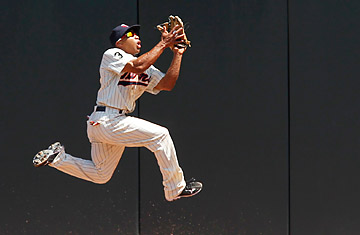
Action like this catch by Minnesota Twins center fielder Ben Revere is not likely to stop anytime soon
For NBA and NFL fans, it's been a rough few months. The NFL had to sweat out a 136-day lockout that almost caused teams to miss preseason games. The resolution, reached in late July, could not have come sooner.
The situation in the NBA looks much more dire. An extended work stoppage in the basketball league, whose lockout started on July 1, looks inevitable. Unless the NBA's players and owners are just posturing like attention-starved boxers, it'll be a miracle if the 2011-12 NBA season tips off on time.
We knew these disruptions were coming because in the months before the collective-bargaining agreements (CBA) of these leagues expired, the players and owners had already started sniping in public. But here it is, just four months before the CBA of this country's third major sport (and supposed national pastime) — Major League Baseball — is about to expire, and you're not hearing a peep about a baseball lockout or strike.
So what is it about baseball? Why is it a safe bet that the sport, which was plagued by a pair of notorious strikes in the 1980s and '90s, won't give us all a third major labor headache within the same calendar year?
Thankfully, over the past decade, baseball owners and players have actually resolved most of the major issues, and each side is profiting as a result. In 2002, for example, the parties agreed to an enhanced revenue-sharing agreement in which the richer major-market teams subsidize the smaller-market clubs. While the deal didn't eliminate competitive imbalance (the New York Yankees can still outspend everyone) and fans of the smaller-market clubs wished their teams spent more of these revenue-sharing funds on better players — I'm looking at you, Florida Marlins — both sides seem relatively content with how everything worked out. By contrast, the NBA has an ineffective revenue-sharing system and is claiming that its teams lost a combined $300 million last season.
The proof of baseball's parity is on the playing field. The bottom line is that since 2001, nine different teams have won the World Series. Only Boston, which took the 2004 and '07 championships, repeated in the decade. Small-market clubs like Tampa Bay, Minnesota and Milwaukee made the playoffs. Heck, this season even the Pittsburgh Pirates, who have suffered through 18 straight losing seasons, looked like pennant contenders before going into a predictable second-half swoon (the team is currently 58-64).
Though baseball does not have a salary cap, in 2002 the players agreed to a deal in which teams who spent above a certain threshold would pay a "luxury tax." The tax, however, has not ended up curbing player salaries. According to an Associated Press analysis, the average salary for major-league players was $2.38 million back in 2002. Today, it's $3.31 million, a 39% jump. No wonder the players have little reason to want to strike.
The owners are cashing in as well. Thanks in part to baseball's investment in digital media — MLB.com is the best league-run site around — league-wide revenues have jumped from $3.6 billion in 2002 to $7 billion in '10, a 94% rise. Says Michael LeRoy, a sports expert at the University of Illinois' School of Labor and Employment Relations: "In this broader economic environment, if you've got a good thing going, there's no need for a new paradigm."
